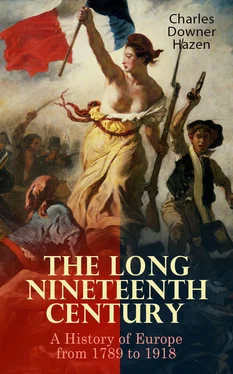The form of government was to be monarchical. This was in conformity with the wishes of the people as expressed in the cahiers, and with the feelings of the Constituent Assembly. But whereas formerly the king had been an absolute, henceforth he was to be a limited, a constitutional ruler. Indicative of the profound difference between these two conceptions, his former title, King of France and of Navarre, now gave way to that of King of the French. Whereas formerly he had taken what he chose out of the national treasury for his personal use, now he was to receive a salary or civil list of the definite amount and no more of 25,000,000 francs. He was to appoint the ministers or heads of the cabinet departments, but he was forbidden to select members of the legislature for such positions. The English system of parliamentary government was deliberately avoided because it was believed to be vicious in that ministers could bribe or influence the members of Parliament to do their will, which might not at all be the will of the people. Ministers were not even to be permitted to come before the legislature to defend or explain their policies.
A departure from the principle of the separation of powers, in general so closely followed, was shown in the granting of the veto power to the king. The king, who had hitherto made the laws, was now deprived on the law-making power, but he could prevent the immediate enforcement of an act passed by the legislature. There was much discussion over this subject in the Assembly. Some were opposed to any kind of a veto; others wanted one that should be absolute and final. The Assembly compromised and granted the king a suspensive veto, that is, he might prevent the application of a law voted by two successive legislatures, namely, for a possible period of four years. If the third legislature should indicate its approval of the law in question, then it was to be put into operation whether the king assented or not.
The king was to retain the conduct of foreign affairs. He was to appoint and receive ambassadors, was to be the head of the navy and army, and was to appoint to higher offices. The Assembly at first thought of leaving him the right to make peace and war, then, fearing that he might drag the nation into a war for personal or dynastic and not national purposes, it decided that he might propose peace or war, but that the legislature should decide upon it.
The legislative power was given by the Constitution of 1791 to a single assembly of 745 members, to be elected for a term of two years.
Several of the deputies desired a legislature of two chambers, and cited the example of England and America. But the second chamber in England was the House of Lords, and the French, who had abolished the nobility, had no desire to establish an hereditary chamber. Moreover the English system was based on the principle of inequality. The French were founding new system upon the principle of equality. Even among the nobles themselves there was opposition to a second chamber the provincial nobility fearing that only the court nobles would be members of it. On the other hand, the Senate of the United States was a concession to the states-rights feeling, a feeling which the French wished to destroy by abolishing the provinces and the local provincial patriotism, by thoroughly unifying France. Thus the plan of dividing the legislature into two chambers was chamber deliberately rejected, for what seemed good and sufficient reasons.
How was this legislature to be chosen? Here we find a decided departure from the spirit and the letter of the Declaration, which had asserted that all men are equal in rights. Did not this mean universal suffrage? Such at least was not the opinion of the Constituent Assembly, which now made a distinction between citizens, declaring some active, some passive. To be considered an active citizen one must be at least twenty-five years of age and must pay annually in direct taxes the equivalent of three days' wages. This excluded the poor from this class, and the number was large. It has been estimated that there were somewhat over 4,000,000 active citizens and about 3,000,000 passive.
The active citizens alone had the right to vote. But even they did not vote directly for the members of the legislature. They chose electors at the ratio of one for every 100 active citizens. These electors must meet a much higher property qualification, the equivalent of from 150 to 200 days' wages in direct taxes. As a matter of fact this resulted in rendering eligible as electors only directly by about 43,000 individuals. These electors chose the members of the legislature, the deputies. They also chose the judges under the new system. Thus the Constituent Assembly, so zealous in abolishing old privileges, was, in defiance of its own principles, establishing new ones. Political rights in the new state were made the monopoly of those who possessed a certain amount of property. There was no property qualification required for deputies. Any active citizen was eligible, but as the deputies were elected by the propertied men, they would in all probability choose only propertied men - the electors would choose from their own class.
The judicial power was completely revolutionized. Hitherto judges had bought their positions, which carried with them titles and privileges and which they might pass on to their sons. Henceforth all judges, of whatever rank in the hierarchy, were to be elected by the electors described above. Their terms were to range from two to four years. The jury, something hitherto absolutely unknown to modern France, was now introduced for criminal cases. Hitherto the judge had decided all cases.
For purposes of administration and local government a new system was established. The old thirty-two provinces were abolished and France was divided into eighty-three departments of nearly uniform size. The departments were divided into arrondissements, these into cantons, and these into municipalities or communes. These are terms which have ever since been in vogue.
France, from being a highly centralized state, became highly decentralized. Whereas formerly the central government was represented in each province by its own agents or office-holders, the intendants and their subordinates, in the departments of the future the central government was to have no representatives. The electors, described above, were to choose the local departmental officials. It would be the business of these officials to carry out the decrees of the central government. But what if they should disobey? The central government would have no control over them, as it would not appoint them and could neither remove nor discipline them.
The Constitution of 1791 represented an improvement in French government; yet it did not work well and did not last long. As a first experiment in the art of self-government it had its value, but it revealed inexperience and poor judgment in several points which prepared trouble for the future. The executive and the legislature were so sharply separated that communication between them was difficult and suspicion was consequently easily fostered. The king might not select his ministers from the legislature, he might not, in case of a difference of opinion with the legislature, dissolve the latter, as the English king could do, thus allowing the voters to decide between them. The king's veto was not a weapon strong enough to protect him from the attacks of the legislature, yet it was enough to irritate the legislature, if used. The distinction between active and passive citizens was in plain and flagrant defiance of the Declaration of the Rights of Man, and inevitably created a discontented class. The administrative decentralization was so complete that the efficiency of the national government was gone. France was split up into eighty-three fragments and the coordination of all these units, their central direction toward great national ends in response to the will of the nation as a whole, was rendered extremely difficult, and in certain crises impossible.
Читать дальше












